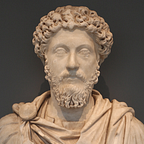A Conversation About Morality
In my first article about my agnosticism, one of my friends who read it then asked a follow-up, “How does one ground morality if one doesn’t believe in the supernatural God (e.g., afterlife, an intervening God).
Qualifying Statement. I know how the following post can go, so let me just say it now: a lot of good is done in this world by people who believe in a God, read scripture, and practice their faith. Whether Christian, Muslim, Jewish, or others, millions do good from the moral code they learn from that faith.
The short answer to my friend is: the best moral code created was secular and has stood the test of time better than religious moral codes coming from sources like the Bible.
Scripture Fluctuates
The argument for a God-based moral code is that without it, people can just make up their own morality. All they need is power to create a moral code that would allow for barbarism to exist. It’s a compelling argument when you consider things like The Holocaust or even the millions who died in nations like China and the former USSR. Maybe others look at people like Charles Manson or death cults like Jim Jones and come to the same conclusion.
However, despite what many may think, I do not believe that the authority of God creates morality. People create morality, and always have, even in the name of religion. This fluctuation is a good thing!
I think I can articulate this fact pretty easily by just looking at the issue of American Slavery and Christianity.
Today, I would hope, there isn’t a single Christian denomination that would argue that the Bible supports slavery, especially the American version of racialized chattel slavery.
Imagine if a preacher today began using verses like Genesis 9:24–27; Ephesians 6:5–8; or Colossians 3:22–24 to justify bringing back slavery. Then added that Jesus never spoke out against slavery as additional proof, I’m sure churches would disavow this lunatic.
But that’s exactly what happened in the past. Christian felt morally correct, because of scripture, for enslaving other human beings. Yes, there were Christians who fought against slavery, but that drives home my main point.
Two groups of people, using the same book of scripture, came to opposing moral views on slavery.
This divide didn’t end in 1865, Christians still used scripture to justify Jim Crow, segregation, and even lynchings.
Here is just one example of a white preacher calling for a lynch mob. Reverend Robert Elwood, in Delaware, using 1 Corinthians 5:13 to a crowd of 3,000 people in 1903 to demand the lynching of George White for raping and killing a 17-year old white girl.
Again, other Christians denounced these actions. But apparently, God’s morality was not clear, and the majority then sided with a version of morality that we do not hold today.
Last, take a deeper look at killing/murder. Even that isn’t clear in the Bible depending on which version you read (Exodus 20:13):
- Thou shalt not kill: King James Version
- You shall not murder: New International
- Thou shalt not kill: 21st Century King James
- You shall not murder: New King James
- You shall not murder: New American Standard Bible
Three of the most popular versions of the Bible cannot agree on “kill” or “murder” and even three version of King James differs. Here, we have the foundation of morality based on the shaky foundation of human translation.
An Absolute Truth
There’s probably one moral code that most people accept, commonly known as the Golden Rule. It’s clear, people ages 2–100 can apply it easily, it fits most situations, and just about everyone knows it.
For Christians, it’s found in Matthew 7:12:
In everything, therefore, treat people the same way you want them to treat you, for this is the Law and the Prophets. — New American Standard Bible
Luckily, all the other biblical translations say the same thing. Furthermore, it’s found in just about every culture and religion starting as far back as Confucius (a definite human, not deity) 500 years before Jesus gave his Sermon on the Mount.
The Golden Rule is secular.
For the agnostic, a believer, or a non-believer, the Golden Rule is actually a good place to start for any moral code. Can a secular moral code result in corruption? Sure. Can a religious moral code result in corruption? Sure.
Here’s a quick example of the latter, that just happened. Look up the case of Haneen Hossam in Egypt. Basically, she was arrested for being an influencer on TikTok. In Egypt, a very conservative nation, she was sentenced to two years in jail for “promoting immorality by encouraging women to make money through social media.” She spent 10 months in jail, and was then sentenced to 10 more years for Human Trafficking.
Is that moral? Who decides?
Obviously, finding your moral code in scripture is a personal choice. I don’t fault those people. My point is that religious people still interpret holy scriptures to their current environment. They don’t take a God-based, absolute view of morality as they may think.
Therefore, for agnostics and others who question religion, a moral code based on human definitions is just as legitimate as the 10 Commandments. God is not necessary for morality.
